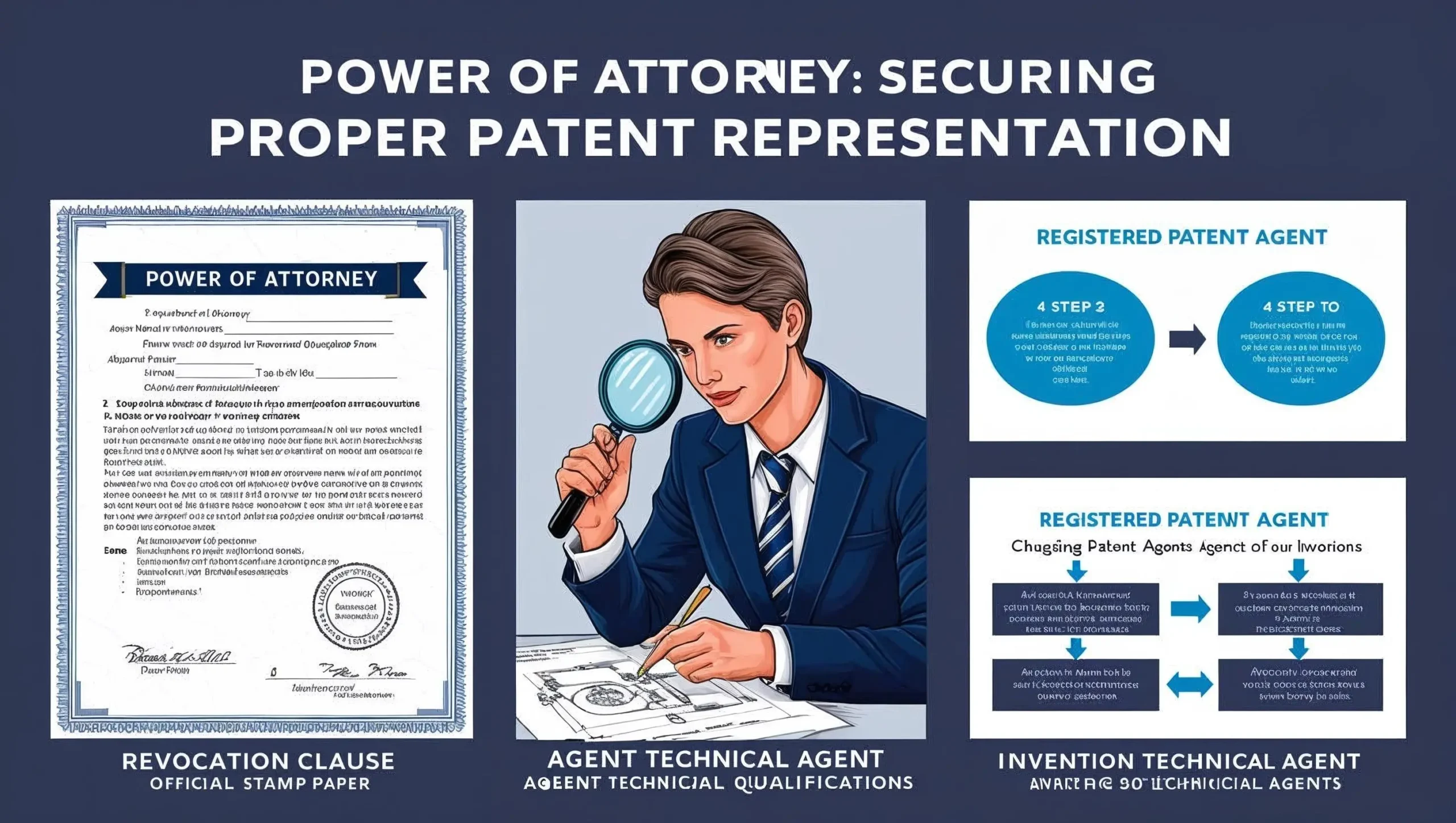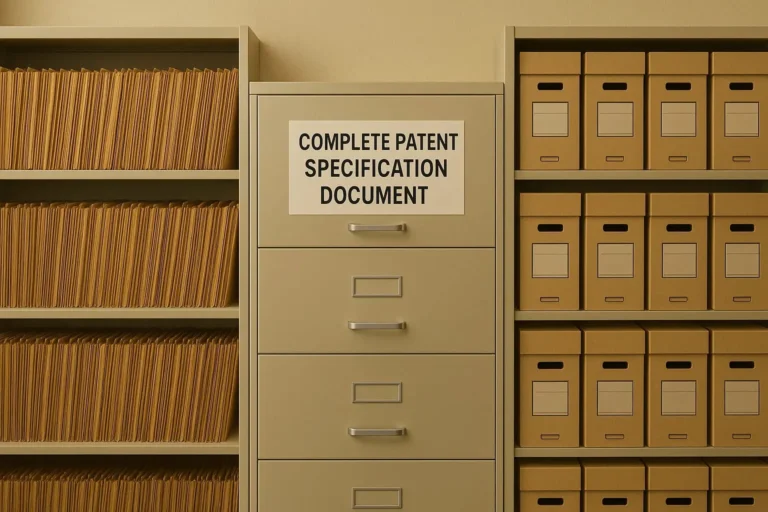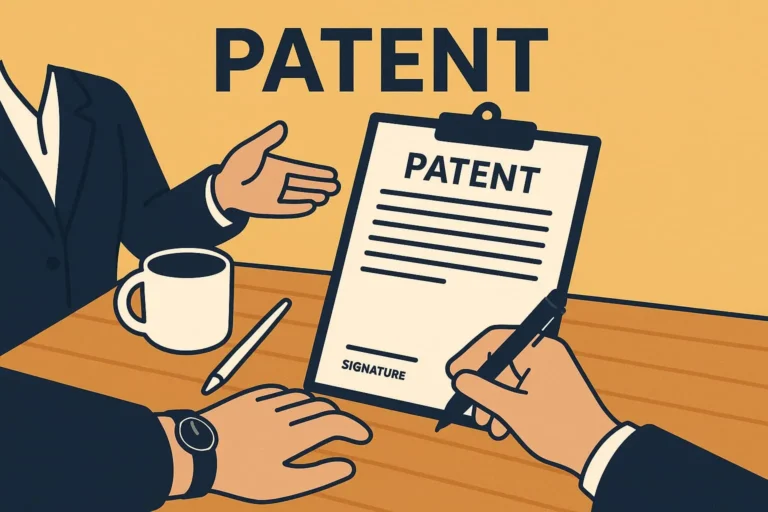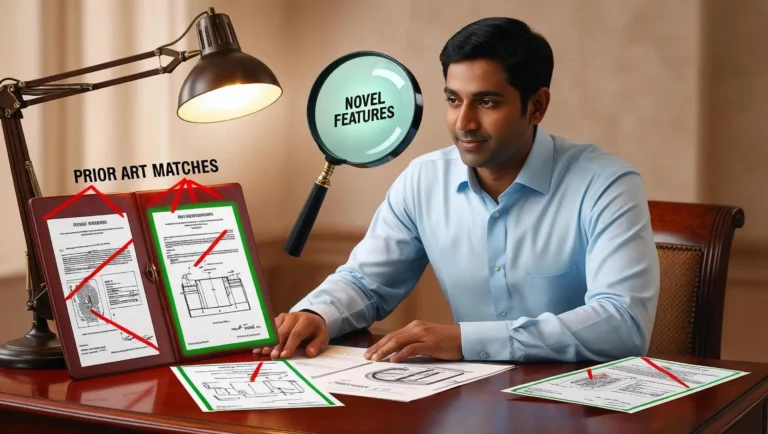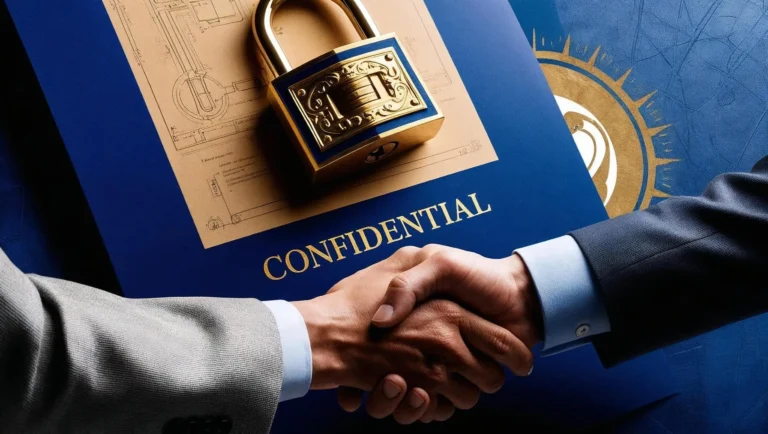Power of Attorney for Patent Applications: Understanding Patent Agents and How to Change Representatives
Table of Contents
- Why Read This Guide
- The Critical Role of Patent Agents
- The Patent Agent Register
- Power of Attorney (POA)
- When and How to Change Your Patent Agent
- Consequences of Patent Agent Negligence
- Important Terms to Check in Your Patent POA
- Working with Law Firms vs. Individual Patent Agents
- Conclusion
- Frequently Asked Questions
Why should you read this guide about Power of Attorney and Patent Agents from start to end?
The first objective of this comprehensive guide is to help inventors understand the critical role of patent agents in the patent filing process, with special focus on the Power of Attorney (POA) document that establishes your legal relationship with your chosen representative.
The second objective is to provide inventors and applicants with practical knowledge about selecting the right registered patent agent, ensuring their technical expertise aligns with your invention, and knowing when and how to change your patent representation if needed.
The Critical Role of Patent Agents in Protecting Your Intellectual Property
Patent agents are professionals with technical backgrounds who have passed the patent agent examination conducted by the Indian Patent Office. Their role extends beyond simple paperwork – they are your technical advocates who translate your innovative concepts into legally protected intellectual property.
When selecting a patent agent, their technical education and expertise should align closely with your invention’s field. For instance, if your mechanical invention involves complex engineering principles, choosing a patent agent with a mechanical engineering background ensures they can fully understand and properly protect the technical nuances of your innovation. Similarly, for software or electronic inventions, a patent agent with relevant expertise in these fields would be more effective in drafting claims that capture the essence of your technology.
This technical alignment is not just a preference but a necessity for maximizing patent protection. In my experience as a patent attorney, patent agents with domain-specific knowledge can:
- Better understand the novel aspects of your invention compared to existing prior art
- Draft stronger, broader claims that capture the core innovation while avoiding known prior art
- Anticipate potential objections from patent examiners based on their experience in your field
- Formulate more effective responses to examination reports with technical credibility
- Identify subtle prior art references that might affect your application’s novelty
The Patent Agent Register: Verifying Credentials
The Indian Patent Office maintains an official register of qualified patent agents who have passed the rigorous patent agent examination. This examination tests their knowledge of patent laws, rules, procedures, and technical drafting skills.
Always verify your patent agent’s registration status by checking the Patent Agent Register maintained by the Indian Patent Office before engaging their services. Only registered agents are legally authorized to represent applicants before the Patent Office, and working with unregistered individuals can lead to serious consequences.
I’ve seen cases where inventors worked with unregistered “experts” who claimed to offer patent services at lower costs, only to have their applications improperly filed, deadlines missed, or claims drafted so poorly that they offered virtually no protection. The Patent Office communicates officially only with registered patent agents, so choosing an unregistered representative could result in missed official communications or improperly filed responses.
Power of Attorney (POA): The Legal Foundation of Representation
The Power of Authority (POA) is the essential legal document in the patent process that authorizes your chosen patent agent to act on your behalf before the patent office. This authorization is critical for streamlining communication with the patent office and ensuring your application receives proper professional handling.
The POA serves several crucial functions in the patent application process:
It officially designates your patent agent as your legal representative, authorizing them to file documents, respond to office actions, and attend hearings on your behalf. Without this formal authorization, the patent agent cannot legally represent you, regardless of any informal arrangements or agreements you might have.
The document establishes clear lines of responsibility and authority in the patent relationship. While your patent agent becomes legally authorized to handle procedural matters, major decisions regarding the scope of your application still require your explicit approval. This balanced arrangement ensures professional handling while maintaining your ultimate control over key aspects of your patent protection.
Perhaps most importantly for inventors, the POA provides flexibility in representation. If you become dissatisfied with your current patent agent for any reason, you can change representation at any time by executing a new POA with another agent. This flexibility protects you from being locked into an unsatisfactory relationship and ensures your valuable intellectual property remains properly managed throughout its lifecycle.
The POA must be properly executed on stamp paper with the appropriate stamp duty, which varies by state. For example, in Maharashtra, the stamp paper value is ₹500. Other states may have different requirements, so it’s important to verify the appropriate stamp paper value for your jurisdiction before executing the document.
When and How to Change Your Patent Agent
In my years of practice, I’ve encountered numerous situations where inventors needed to change their patent agent:
- Non-responsiveness or consistently delayed responses to important communications
- Performance issues, strategic disagreements, or concerns about escalating costs
- Closure of the agent’s practice or unexpected winding up of business
- Conflicts of interest that emerge during the representation process
- The agent’s inability to handle your matter due to health or other circumstances
According to Rule 135(2) of the Patents Rules, 2003, any service of documents related to patent proceedings made to the agent is considered service upon the Applicant. Therefore, updating your representative details with the Patent Office is crucial to ensure all official correspondence reaches you through your new patent agent without delays.
The process for changing your patent agent is straightforward, though requires attention to detail:
- As a matter of professional ethics, settle any outstanding payments with your current agent before initiating transfer proceedings. In my experience, attempting to change representation while disputing fees often leads to unnecessary complications and delays.
- Obtain all relevant files and documents from your former agent. These include:
- Form 2 (Complete Specification) in editable format
- Signed Copy of Form 1 (Application for Patent)
- Signed copy of the existing POA
- All correspondence with the Patent Office
- Importantly, request editable (.doc) files of all documents, not just PDF versions
- Execute a new Power of Attorney with your incoming agent. According to the Manual of Patent Office Practice and Procedure, 2019, this new POA should include the specific language: “I/We, hereby revoke all previous authorizations, if any, in respect of same matter or proceeding.”
- File this new POA with the Patent Office to formally update your representation. Upon filing this document with the revocation clause, the powers of the old agent will be automatically revoked, and your new agent’s authority will take immediate effect.
After the transfer is complete, your new agent should conduct a thorough audit of your files to identify and address any potential issues or non-compliances. This review is crucial as negligence by a previous agent could have serious implications for your patent rights if not promptly corrected.
Consequences of Patent Agent Negligence: A Real-World Example
In my practice, I’ve witnessed several cases where negligence by a patent agent had serious consequences. One instructive legal example is the case of European Union v. Union of India, where a delay in responding to the First Examination Report occurred due to a patent agent’s mistake. Had the Court not recognized that the Applicant had no intention of abandoning the application, the Applicant could have permanently lost exclusivity over their valuable invention.
This case highlights why working with competent, responsive patent agents is essential, and why understanding your right to change representation when necessary is a vital safeguard for inventors.
Important Terms to Check in Your Patent POA
When reviewing your Power of Attorney document, ensure it includes these key elements:
- Clear identification of all parties involved, including applicant names, inventor names, and complete patent agent details with registration numbers
- Specific scope of authority granted to the agent for representing your interests
- Duration of the authorization (typically valid until explicitly revoked)
- A clear revocation clause that explicitly states this POA revokes all previous authorizations
- Proper signatures and dates from all relevant parties, properly executed on appropriate stamp paper
Working with Law Firms vs. Individual Patent Agents
If you have a large portfolio of patents to manage, approaching a law firm with multiple registered patent agents and an online docketing system can be advantageous. These firms typically have robust systems in place to manage due dates and formal requirements associated with your patent cases.
However, when working with larger firms, I always advise my clients to:
- Clarify which specific registered patent agent will be handling your case, not just the partner’s name
- Ensure the assigned agent has relevant technical expertise in your specific field of innovation
- Request regular, direct communications with the registered agent, not just junior associates
- Verify that senior patent agents are properly reviewing work done by associates before submission
Whether you choose a large firm or an individual patent agent, the most important factor is ensuring that your representative has both the technical knowledge to understand your invention’s nuances and the legal expertise to navigate the complex patent system effectively.
Conclusion
The Power of Attorney relationship between you and your patent agent forms the foundation of the patent process. By understanding what to look for in a patent agent, verifying their registration status, checking the key elements of your POA, and knowing when and how to change representation if needed, you can navigate the patent system more effectively and protect your valuable intellectual property.
Remember that as the inventor or applicant, you retain ultimate control over your patent application. The POA empowers your agent to act on your behalf, but you have the freedom to revoke that authority and transfer it to a new representative at any time. This flexibility ensures that your innovative ideas remain protected throughout the patent process, even if circumstances change or relationships with particular agents prove unsatisfactory.
By choosing a patent agent whose technical expertise aligns with your invention, maintaining clear communication throughout the process, and exercising your right to change representation when necessary, you can maximize your chances of securing strong, enforceable patent protection for your innovations.
Frequently Asked Questions About Patent Agents and POA
How do I verify if a patent agent is registered in India?
I always advise inventors to check the official Patent Agent Register maintained by the Indian Patent Office website before engaging any patent professional. The register lists all authorized patent agents along with their registration numbers. In my practice, I’ve encountered several cases where inventors were misled by unregistered “consultants” claiming to offer patent services, only to discover later that their applications were improperly handled. Always verify credentials and ask for the registration number upfront.
Can I file a patent application without a patent agent?
Yes, you can file a patent application yourself, but I strongly advise against it for most inventors. Having handled numerous patent applications, I can attest that patent drafting is a specialized skill that combines technical knowledge with legal expertise. While self-filing might save initial costs, poorly drafted applications often lead to narrow protection or outright rejection. Most inventors I’ve worked with who initially filed themselves ultimately sought professional help later, often at greater total expense than if they had started with a qualified agent.
What is the typical cost of hiring a patent agent in India?
In my experience, professional fees for patent agents in India typically range from ₹35,000 to ₹70,000 for drafting a complete specification, depending on the complexity of the invention and the agent’s experience. Additional charges apply for filing forms, responding to examination reports, and other prosecution steps. While some agents offer lower rates, I’ve consistently observed that extremely low-cost services often compromise on quality, particularly in claim drafting—the most critical part of your patent. I recommend focusing on value rather than simply seeking the lowest price.
How long does the Power of Attorney remain valid?
From my extensive experience filing POAs, they remain valid until explicitly revoked or the patent expires. However, if there’s a change in the legal status of either party (such as if the applicant company is acquired or the patent agent retires), a new POA may be necessary. I typically advise clients that while a POA has no expiration date, it’s good practice to review your representation periodically, especially for patents with long-term commercial value.
Can I have multiple patent agents representing the same application?
Yes, you can appoint multiple patent agents for the same application, but in my practice, I generally advise against it unless there’s a specific strategic reason. Having managed cases with multiple representatives, I’ve seen firsthand how this can create confusion about responsibility, potentially leading to missed deadlines or conflicting approaches. If you do appoint multiple agents, establish clear communication protocols and designate a primary contact to coordinate with the patent office.

